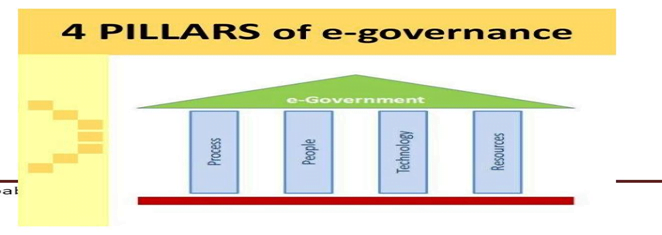Governance
Context: In an interview earlier this month, Telecom Minister Ashwini spoke about a comprehensive policy roadmap for India’s digital economy and digital governance.
In this regard, let us discuss Digital Governance in detail:
What is digital governance ?
- Electronic governance or e-governance can be defined as the usage of Information and Communication Technology (ICT) by the government to provide and facilitate government services, exchange of information, communication transactions and integration of various standalone systems and services.
What is “global digital governance”?
- Global digital governance encompasses the norms, institutions, and standards that shape the regulation around the development and use of these technologies. Digital governance has long-term commercial and political implications.
What are the three domains of e-governance?
- E-administration: improving government processes
- E-services: connecting individual citizens with their government
- E-society: building interactions with and within civil society.

Is there a historical parallel to governing key economic sectors globally?
- Digital economy is not unprecedented: Sectors critical to the global economy are subject to international cooperation frameworks and pacts.
- Therefore, the idea of setting up a single multilateral organization with a mandate to govern the digital economy is not unprecedented.
- The International Commission for Air Navigation (ICAN): Global aviation has been regulated since 1903 when the International Commission for Air Navigation (ICAN) first met, subsequently replaced by the International Civil Aviation Organization (ICAO) in 1947.
- Bank for International Settlements (BIS): Similarly, the modern international banking system is governed by the Bank for International Settlements (BIS), an institution initially set up in the interwar period in 1930 to oversee Germany’s reparations to the Allies under the Treaty of Versailles.
- The BIS acquired a more global mandate beginning in the 1950s and is now partially responsible for global financial stability.
Who are the key players in the global contest for digital governance?
- China seeks to champion the concept of cyber sovereignty: An authoritarian vision drives the first model. Most notably, China is emerging as the standard-bearer for this model with its desire to “reinvent the internet.”
- China seeks to champion the concept of “cyber sovereignty,” allowing countries to control access to the internet, censor content, and institute data localization requirements, as a pretext to protecting individual national interests.
- European Union’s General Data Protection Regulation (GDPR): This model primarily seeks to protect the privacy and rights of internet users and online content consumers.
- Adopted with the overwhelming support of the European Parliament in 2014, the GDPR came into effect in May 2018, giving firms that rely on digital technologies the opportunity to modify their data usage and privacy policies.
- The adoption of the GDPR has been a turning point for global internet governance as consumers gained unprecedented control over their data in a manner that preserved freedom and openness online.

Why global digital governance is important?
- The main objective of e-governance is to provide a friendly, affordable, and efficient interface between a government and its people. It is about ensuring greater transparency, accountability, and objectivity, resulting in cost-effective and high-quality public service.
- Minimum rights and protections for platform workers: Under the G20, the International Labour Organisation has already placed a proposal in the employment working group for digital labour platforms to develop an international governance system determining minimum rights and protections for platform workers.
- Implementation of central bank digital currency projects: Similarly, on digital money, a reincarnated Bretton Woods is being advocated to address the distrust in private currencies and to coordinate the implementation of central bank digital currency
- Digital taxation: Finally, in the deeply contested area of digital taxation, the OECD facilitated Base Erosion and Profit Shifting (BEPS) negotiations and helped arrive at a global solution.
- Digital sovereignty: The internet is splintering and digital sovereignty is now commonplace; yet, there is no better time for countries to come together and build a framework for global digital governance.
What are the big 5 tech companies called?
- The Big Five tech giants—Apple, Amazon, Google (Alphabet), Facebook (Meta), and Microsoft which are major stakeholder in the digital world at present.
Initiatives Taken for e-Governance in India:
- Bhoomi Project (Karnataka): Online Delivery of Land Records: Bhoomi is a self-sustainable e-Governance project for the computerized delivery of 20 million rural land records to 6.7 million farmers of Karnataka.
- KHAJANE (Karnataka): End-to-end automation of Government Treasury System: It has been implemented mainly to eliminate systemic deficiencies in the manual treasury system and for the efficient management of state finances.
- e-Seva (Andhra Pradesh): Designed to provide ‘Government to Citizen’ and ‘e-Business to Citizen’ services.
- e-Courts: launched by the Department of Justice, Ministry of Law, and Justice. The Mission Mode Project (MMP) aims at utilizing technology for improved provisioning of judicial services to citizens.
- e-District: Launched by the Department of Information Technology. The MMP aims at delivery of high volume, citizen-centric services at the district level such as the issue of birth/death certificate, income and caste certificates, old age, and widow pension, etc
- MCA21: Launched by the Ministry of Corporate Affairs. The project aims to provide electronic services to the Companies registered under the Companies Act.
Conclusion:
The rapid digitalisation of the world along with a new focus on trust in the global supply chains for digital products and services presents tremendous opportunities for India and its youth. It is now up to all of us to engage in a collective “sabka prayas” to realise New India’s economic potential.
Source: The Hindu











